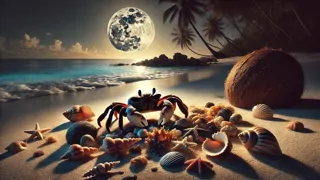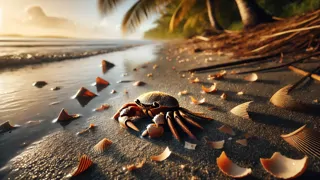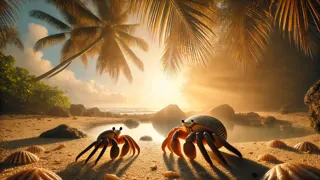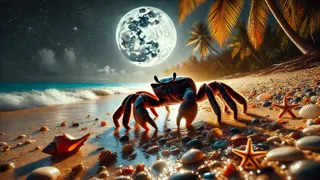Introduction
Night had fallen across Guam’s northern shore, painting the sky with satin indigo and dustings of starlight that danced on the gentle swell of the Pacific. Palm fronds whispered lullabies in the warm breeze, and phosphorescent algae along the tideline glowed like scattered lanterns at the water’s edge. In this hush of tropical midnight, a solitary figure crept from a rocky outcrop—a massive coconut crab, its dark carapace mottled in deep umber and russet. Each deliberate step across the sand left a curved imprint, as though nature itself were recording the creature’s journey. The crab’s eyes, like polished jet beads, fixed on a cluster of iridescent shells glimmering beneath the moon’s pale gaze. Drawn by the lure of shine and color, it flexed its formidable pincers, eager to add new trophies to its empty shell. And yet, in that moment of quiet anticipation, a silent reckoning awaited: a fable’s turning point, where ambition teeters on the brink of ruin. On Guam’s shores, legends of the sea often warn of balance and respect. But as the crab approached its glittering prize, no ancient whisper nor ancestral caution stirred in the air. Only the hush of night, waiting to witness whether the crab’s hunger for beauty would become its undoing.
Moonlit Temptation
Under the soft glow of a full moon, the coconut crab scuttled toward a cluster of shells that lay like jeweled treasures on the shoreline. Each shell wore its own pattern: spiral swirls of white and ochre, bands of translucent pink, flecks of sapphire and charcoal. The air smelled of salt and damp wood from the palms overhead as the crab’s pincers buzzed with desire. With cautious calculation, it picked up a particularly lustrous shell—a smooth, pearly fragment that fit snugly beneath its right pincer. It hissed a low, satisfied rasp, then turned to claim a second piece, a coral shard the color of sunrise clouds. But the more it gathered, the heavier its burden became. Instinct urged the crab to stay close to its burrow among volcanic boulders, where the porous caves offered shelter and safety. Yet greed clawed at its mind, whispering promises of admiration from other crustaceans, elevation above ordinary scavengers on this island rim. Deeper into the night, the crab ventured beyond the safe line of retreat, clustering shells like a hoarder’s dream beneath one claw. The tide, once retreating, began to creep back in, each wave threatening to flood its prize. Still, the crab refused to relent, twisting and turning to scoop up the smallest glimmering fragment it could lift. Beneath the silver light, it became blind to hazard and heedless of nature’s balance. The breath of the ocean pulled at every grain of sand, poised to reclaim what had been scattered across the dunes.

The Hollow Shell
When the first wave lapped higher than usual, the coconut crab felt a sudden chill. Its shell, swollen by the night’s haul, provided little room for it to retreat. Each crash of foam against rock reminded it that the sea was waking, hungry to reclaim what the shore once shared. In panic, the crab clattered its claws, attempting to wrench its heavy bounty free. One by one, shells tumbled back into the water, drawn away by the current’s playful tug. Heart pounding through its exoskeleton, the crab followed each sinking treasure into dark ripples, only to find the ocean indifferent. In its haste, the creature lost more than it had bargained for. With a final ominous swell, the sea surged and a swell of water knocked the crab askew, sending it skittering across damp sand. When the retreat came, it left behind an empty shell on the beach—a shell that once guarded the crab’s soft underbelly, now cracked and ruined beside broken fragments of its ego. Exposed and vulnerable, the crab froze. It knew, through ancient instinct, that without its carapace it risked not only shame, but mortal peril. Its limbs, already weary from lifting beyond its strength, trembled as dusk turned to dawn. Far off, gulls cried in the rising sun, and hermit crabs emerged from hidden coves to scour the shoreline. In the crab’s empty shell, the last shards of pride lay scattered, a testament to the cost of avarice. Alone and unprotected, the creature shrank toward the rocky ledges, seeking refuge in the cracks of lava stone, all the while nursing the sting of its own folly.

Retribution and Reflection
By midmorning, the tide had settled into a steady dance, and sunlight set the reef aglow with prismatic shimmer. The coconut crab, now unprotected, moved with careful hesitation between rock pools. Each step felt like a gamble, every shadow a potential threat. Along the edge of shallow water, a gaunt shorebird eyed it with a sharp glint before flitting away. Crabs of lesser size scurried past, indifferent or amused by the creature’s humbled posture. In a shallow hollow, the crab spotted its broken shelter and felt a pang deeper than hunger. It had risked everything for a few sparkles, only to end up with nothing. Overhead, a coconut fell with a muted thud, reminding the creature that true protection came not from vanity, but from necessity. Weary and wiser, the crab retreated to a narrow cave where it had once found safety. There, it nestled against cool stone and waited as the island’s warmth seeped into its joints. Hours later, a fellow hermit crab—smaller and clad in a modest shell—approached. With tentative chirps, it offered space in its own borrowed home. Though not as grand, the shelter was strong and intact. Together, they ventured back toward the tide line, sharing morsels of algae and small fish scraps. In companionship and humility, the first crab discovered solace and a lesson etched more deeply than any shell would have held: that justice on these shores balanced greed with consequence, and that respect for nature’s boundaries was the greatest treasure of all.

Conclusion
As the sun rose higher above Guam’s coral reefs and palm-dotted hills, the coconut crab remained nestled in its modest borrowed home, wings of cloud drifting lazily across a sapphire sky. It had lost the glittering shells that once symbolized pride and ambition, but in that loss it gained a profound understanding: true strength arises not from spoils taken without consent, but from balance, community, and respect. In sharing warmth and safety with a humble companion, the crab felt more secure than it had ever been in its grandest shell. The beach carried no rancor for the lesson it had delivered; only the steady rhythm of waves continued, indifferent yet ever constant. And so the crab, once driven by greed, learned that justice on these shores was neither harsh nor vengeful, but simply nature restoring equilibrium. From that dawn forward, it ventured forth with newfound wisdom, gathering only what it needed and honoring the boundaries that sustained life on land and sea alike. In its silent reflection, the crab understood that some lessons—though won through hardship—became the richest treasures of all.

















